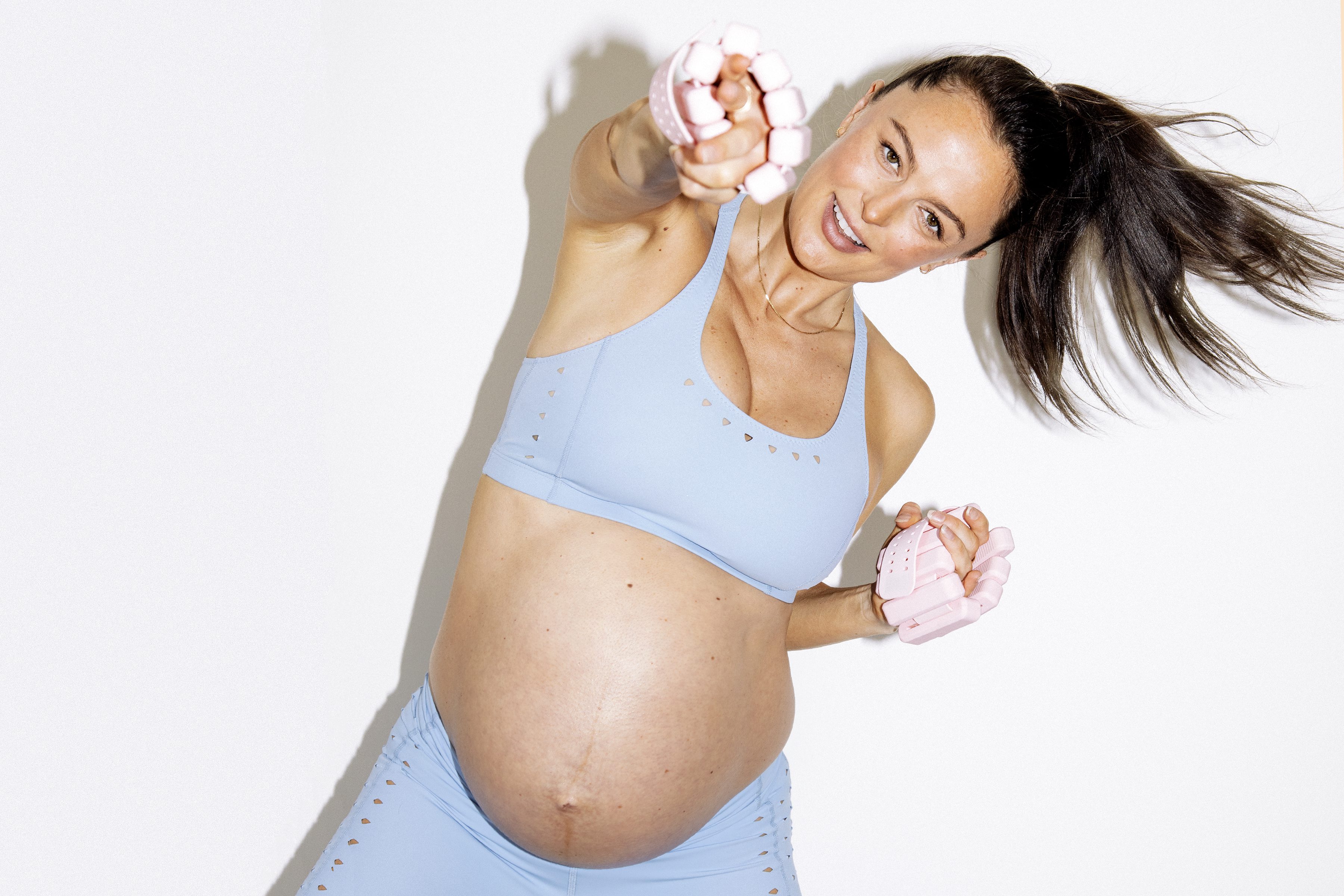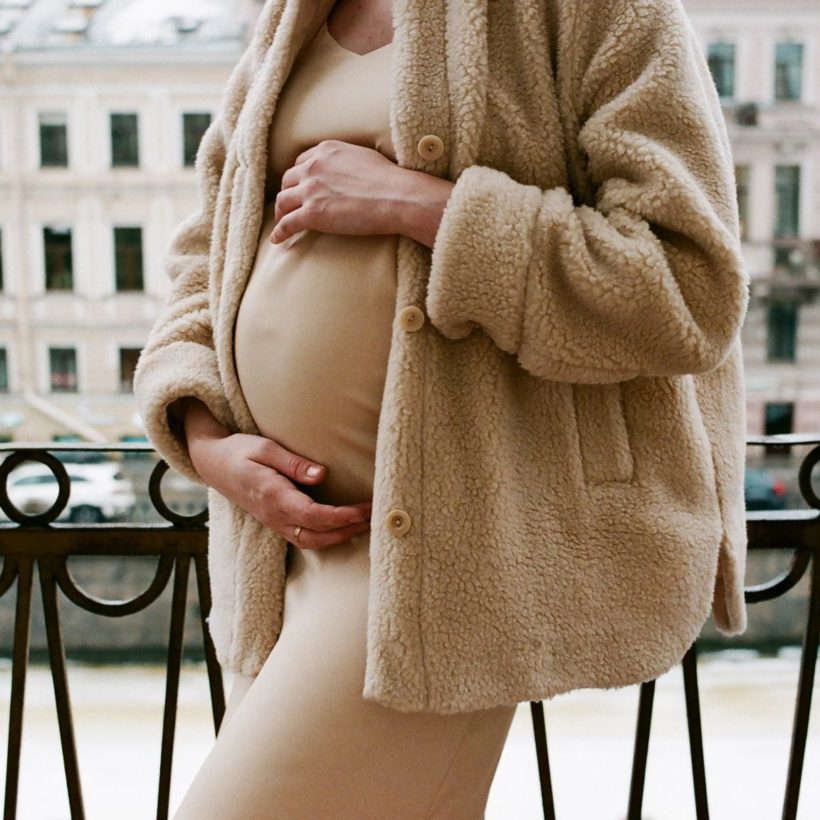The Sculpt Society founder has been incredibly open about her pregnancy and postpartum journey — and what she thinks about the pressure for women to “bounce back.”
“For so long the narrative has been that pregnancy is this amazing, perfect 10 months of your life,” says Megan Roup, founder of The Sculpt Society. You glow, your body a perfectly proportioned vessel, as you enter the rarified air of moms-to-be. “It’s a freaking miracle what you’re doing,” Roup says, “but it’s not always rainbows and sunshine.”
As a professional dancer turned fitness founder, and the force behind the ultra-popular TSS Instagram community, Roup has a unique understanding not just of her own body, but of the way we talk about women’s bodies on social media. “The biggest thing for me was I didn’t expect to have such a hard time experiencing my body change and grow,” she says.
But while pregnancy “felt like five years,” it’s the postpartum period that’s been the most challenging — and eye-opening. “No one really talks about postpartum and what that recovery looks like for women, so I think a lot of women are unprepared for what that physically looks like in those first six to eight weeks,” Roup says. “Even me, knowing so much about the body and postpartum and what your body goes through during pregnancy I still felt shocked and a little unprepared and those really early weeks where I was like, Wow I can barely get out of bed.”
We talked to Roup about birth and its aftermath, working out while breastfeeding, and why the pressure to “bounce back” is BS.
Sunday Edit: As a trainer, you’re pre- and postnatal certified. How prepared did you feel going into pregnancy for all the physical changes?
Megan Roup: What’s so interesting about pregnancy is that everyone’s experience is so different. I think I probably had an “easy” physical pregnancy. But you know, I don’t think you know until your body goes through it what it actually feels like. I always knew what exercises prenatal women shouldn’t be doing, and what ones we could be doing. But to really be able to experience it myself and experience what working out feels like when you’re growing a human, and to teach through that has been such a learning experience.
SE: Did your workouts change much during pregnancy?
MR: To be honest, not a ton besides the things that I really needed to change in my second and third trimester — i.e. no core work as far as laying on your back. Dance cardio still felt great. My workouts got a little shorter. But to be open about it, this is my job. Everybody’s different, everyone’s experience during pregnancy is different. I always say if something isn’t feeling good, don’t do it.
SE: What has the recovery process looked like for you as someone so in tune with their body? And how have you prepared to get back to moving your body?
MR: Pregnancy felt like five years but the physical recovery and physical experience for me, has definitely been harder postpartum. I knew that my six-week appointment postpartum appointment was going to be short and sweet and [they’d clear me for physical activity] but I was still just shocked at how little information was given — like literally no information. So, for women who don’t know and are told by their doctor “you can go back to regular activity” and sign up to go to a workout class the next day, it’s honestly shocking — it’s the worst thing you could do. In those early days, the movement really needs to be intentional and slow — you can’t go from just delivering a child six to eight weeks ago to running on a treadmill.
But there’s so much we can still do in those early days to help strengthen and reconnect ourselves to our pelvic floor. I implemented some of my pelvic floor exercises, like 360 breathing, even when I was in the hospital. It’s not like I’m there sweating, it’s a very small, intentional engagement of your core and your pelvic floor. That type of work has been really helpful. I have a whole section on that as part of my TSS Mama program so I felt pretty confident on how to start to implement that in the early days.
SE: You’ve also been navigating this while breastfeeding — and have been open on social media about how that’s been really difficult. Why is this something you wanted to share publicly?
MR: If there was anything I was really unprepared for, it was breastfeeding. When people asked me how I would choose to feed [my daughter] Harlow, it was like, “Oh yeah, I’m just gonna breastfeed,” not even realizing that she may not latch or there could be a bunch of other issues. I thought you pumped just to get extra milk to freeze it — that was literally my knowledge of pumping.
I realized in my pregnancy journey that a lot of people don’t enjoy pregnancy. And that’s normal. And when I shared that, a lot of people felt less alone. So, I realized if I’m going through this in my breastfeeding journey, there are other women who have gone through it and are feeling probably really alone too because it’s like this shameful thing if you are not able to breastfeed. I wanted to share that and make sure other people felt less alone, and maybe also make myself feel less alone.
SE: You shared before giving birth that, as an entrepreneur, you wouldn’t be able to take maternity leave. Can you tell me about that decision?
MR: It was just a necessity. Our team is so small — it’s really me, my husband and a couple of other amazing, amazing team members. We just aren’t in a place in our business where I could fully step away for eight to 12 weeks. In retrospect, I wish I had taken off at least a solid four weeks where I wasn’t answering emails and I wasn’t on social. But I’m not the only one who can’t have maternity leave. If you are a small business owner or it’s just not possible for your job, I think in our society a lot of women have to go back to work pretty early on.
SE: How do you think your relationship with your body has changed through this journey?
MR: I don’t quite feel at home in my body. That’s something that sort of threw me for a loop during pregnancy. I hear this a lot from women, especially during pregnancy and early postpartum. My relationship with my body is still a really positive one. I think it’s about reminding myself of what I’ve just been through and that it’s going to take time and to nurture myself—I need to remind myself on a daily basis of those things. I’m not going to “bounce back” as people say. I mean, the amount of DM questions I get about that, it’s just unfortunate. To me, that means other women are feeling the same pressure of bouncing back after having a baby and It just doesn’t work like that. It’s going to be a slow process. But it’s funny when it happens to you personally, we’re all just so much harder on ourselves. I’m definitely working on giving myself a little bit more grace.
*This interview has been edited for length and clarity.







